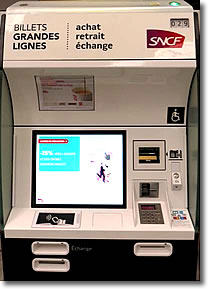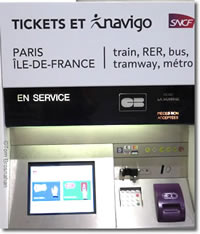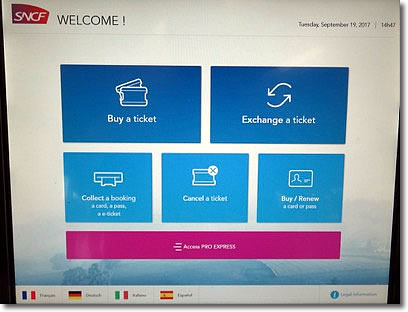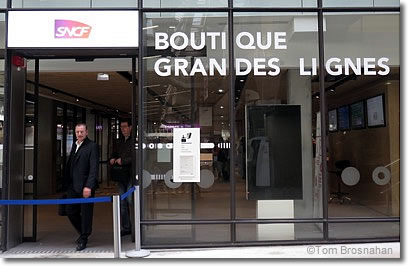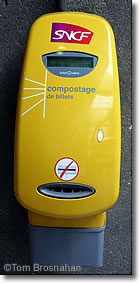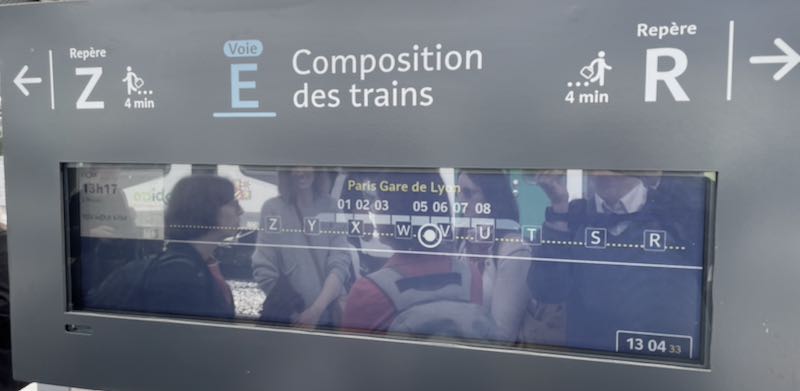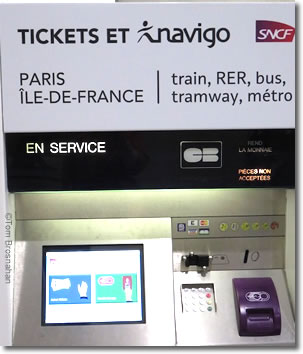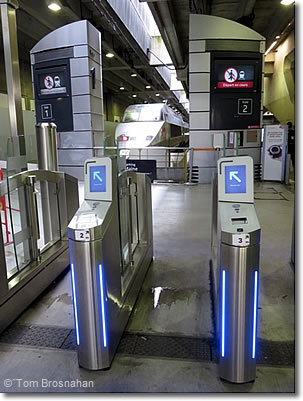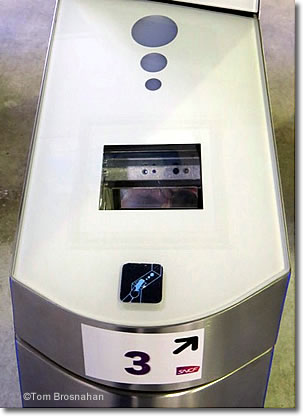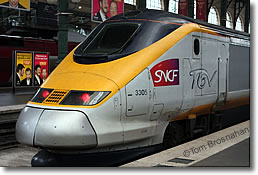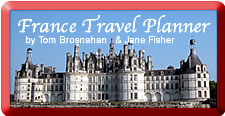 |
How to Buy Train Tickets in France | |
| It used to be easy. Now it's complicated. It's worth it to learn in advance the best way to buy tickets for your train trips in France. |
|
 |
|
Buying train tickets in France can be challenging for a variety of reasons. If you don't know how to buy your ticket, in the time it takes you to learn, you may miss your train. Many Types of TrainsFrance's SNCF railway network operates 15,000 departures daily carrying 10 million passengers to 3000 stations. The service offers a variety of trains, services, and fares: RER, Transilien, TGV, inOui, idTGV, TER, Intercité, Thalys, Eurostar, Ouigo. Click here for a look at the different types of French trains. Buy Early, Save Money!Tickets for SNCF intercity trains go on sale three months in advance. Fares offered early in the three-month period can be substantially lower than those offered close to the travel date. An example: we bought one-way First-Class TGV inOui tickets for a trip from Strasbourg to Paris-Charles de Gaulle Airport three months in advance for 49€ per person. On the day before our journey, fare for the same seats was 86€—nearly twice as much! And if the train had been fully booked (complet), as trains often are close to the departure date, we would have had to travel at a different time, or even on a different day. Buy early, save money & avoid disappointment! Buy Your Ticket(s) Online or by AppThis is best, if it's possible for you. The SNCF-Connect.com website and SNCF-Connect smartphone app are superbly designed and make it easy to plan your trip, buy your tickets, and receive updates. Your electronic ticket on the app is all ytou need to travel. No in-person language barrier at a ticket office, no worry that your credit or debit card won't be accepted at the station, no ticket-machine learning curve, no search for a ticket office with only minutes to catch your train. Set up an account (free), input the details of your proposed trip: One-way/Return (Round-trip), From, To, desired date and time of departure, passenger age, etc. Click Search and you'll see a variety of departures, travel times, and fares for standard SNCF regional, national and international trains. (The cheapest trains and fares, idTGV and Ouigo, may not be among the choices—you must go to those separate websites for them. More...) If you're traveling by SNCF's premium TGV InOui trains, download the TGV InOui Pro app for even better service. The budget Ouigo trains also have their own app. If you prefer a paper ticket, you may be able to print your tickets—if you have a computer printer available. If you can't, write down the reservation code and retrieve your ticket either from a ticket machine at the departure station, or from a ticket agent there. Buy from a Ticket MachineAt train stations you will see ticket machines of several types. In Paris train stations, for example, you'll see ticket (billet) machines for Île-de-France (local and regional) trains, and other machines for Grandes lignes (mainline national and international trains).
Touch the screen, select your language, and follow the instructions:
Ticket machines accept only credit cards with chips (puce) or cards equipped with RFID/NFC ("touchless"), or payment apps such as Apple Pay, Google Pay, etc.; or euro currency (notes and coins). If your ticket is for a short trip on a local or regional train and you don't use the Bonjour RATP app or Île-de-France Mobilités app to buy your ticket, ypu can pay with 2€ and 1€ coins or small notes/bills. For Grandes Lignes tickets, you will need an acceptable credit/debit card or RFID/NFC smartphone payment app. More... 3. Buy from Ticket AgentsLarge urban stations and most city and large-town train stations have human ticket agents from whom you can purchase tickets with cash euros (notes/bills and coins), with chip credit cards and such smartphone payment apps. Follow the signs to the Billetterie (Ticket Office):
Allow plenty of time to get through the ticket-buying process. There may be a waiting line for the ticket agent(s), perhaps as much as 15 or 20 minutes long. The agent(s) may speak no language but French. In large stations, some agents may speak English and perhaps other languages.
Language is usually not a problem if your itinerary is simple, such as "I want a one-way (aller) or round-trip/return (aller-retour) ticket for one adult (adulte) from Paris to Reims" (then give dates and times. 4. Eurail PassFrance's excellent trains are the best way to get around: forget the challenges of driving in a foreign country—let alone paying tolls (they're high in France) and parking. One of the best deals going for touring France, and indeed all of Europe is the Eurail Pass. (Interrail Passes are for European residents. Eurail Passes are for everyone else.) How Eurail Pass WorksPasses can be for 3, 4, 5, 6 or 8 days of unlimited train travel within any 30-day period. For example, you arrive in France and you want to go straight to Provence or the Côte d'Azur. You take a train right from the airport to your destination—Orange, Marseille, Nice, wherever. Change trains as needed. With an Interrail or Eurail pass, you needn't worry about tickets, although you may have to make a reservation in advance for your First Class or Second Class seat (depending upon which Pass you've purchased). High-speed trains and night trains require seat reservations, but these cost you no more, and can be made online or via the SNCF Connect smartphone app. After Provence, you want to see Normandy. Use another day of your Interrail/Eurail Pass to get there. From Normandy you want to go to Paris. That'd be Travel Day 3. So you can travel to three different regions of France in, say, a 10-day trip, with the cheapest Interrail Pass (3 travel days). Eurail DiscountsChildren (4 to 11), Youth (12 to 27) and Seniors (60+) can take advantage of discounted Pass prices. For the full story and to order a Eurail Pass, click here. Boarding Your TrainAt large stations, your train's track/platform will be announced 10 to 20 minutes before the scheduled departure time. At smaller and originating stations, you may be able to board up to 30 minutes in advance at origination stations. In any case, be on the platform ready to board more than five minutes before departure time. The train doors may close a minute or two before departure time. There are two possible boarding procedures, depending on the station: Computerized TurnstilesMajor stations are equipped with computerized turnstiles at which you scan the QR or barcode on your ticket (smartphone or paper) or Interrail/Eurail Pass in order to enter the platform. If you do not see computerized turnstiles, and if you have a paper ticket bought from an SNCF machine or agent and valid for any train, you must follow the older procedure of validating your ticket before entering the platform.
Validating Your Paper Ticket
If the station does not have computerized turnstiles, if you don't have an Interrail Pass, and if you have a paper ticket bought from an SNCF machine or agent, look for the yellow compostage machines near the entrance to the train platforms. Insert your paper ticket into the machine (barcode/QR code end first). The composteur will read the barcode or QR code and thus your ticket will be validated. (On the larger paper tickets it may also print the date and time on the end of your ticket.) There are no validation machines on platforms or on trains! Validate in the station, before going to the train platform and boarding your train. If you fail to validate your ticket, an inspector aboard the train may levy a substantial fine for your failure to validate. Pre-validationIf you bought your ticket for a particular train on a particular date and time, it is probably précomposté (pre-validated). Most tickets bought online, including those you have printed yourself, and many bought from ticket machines and ticket agents for specific trains, are pre-validated, especially tickets for discounted fares available only on that particular train. Read your ticket. If you see a specific train number, date and time, your ticket is pre-validated. You need do nothing else for validation, but you may have to scan its QR or barcode at a turnstile to enter the train platform. Validating on the TrainIf you have an open ticket on paper and you've neglected to validate your ticket before boarding and the train has departed, find the conductor (Chef de Bord), show him or her your ticket, and the conductor will validate it, saving you from legal and financial embarassment. Conductors usually begin their inspections at the rear of the train and work their way forward, so walk toward the rear of the train to find them. If you wait at your seat and the conductor comes through checking tickets and finds yours unvalidated, you may be subject to the fine. Finding Your Train CoachA complet (fully-booked) SNCF train may carry as many as 1400 passengers. There's a system for getting them all on board quickly. Your ticket shows the number of your train coach (voiture), and the number(s) of your seat(s). When your train's platform (quai) is announced, go there and look for a monitor showing the Composition des trains (in railroad parlance, the "consist," or order of train coaches.) The train destination ("Paris Gare de Lyon") will be above a diagram of the train, with the train coaches numbered (01, 02, 03, etc.) Near each train coach will be a letter (A to Z) showing the position (repère) the coach will take on the platform. Move to that position and you should be able to board quickly.
When you enter the train, look for the arrows near the door showing the direction of the seat numbers (such as: <—1 à 34, 35 à 76—>, meaning seats 1 to 34 are to the left, and seats 35 to 76 are to the right). In double-decker cars, arrows will also indicate upper and lower seating areas. Place large suitcases in the luggage racks near the doors of the seating area, and smaller items in the rack above your seat.
|
|
Is this where you buy your train ticket? Do you have the right kind of payment? There's a lot to learn...
Search for Car Rental
Hotel Map with Prices:
|


